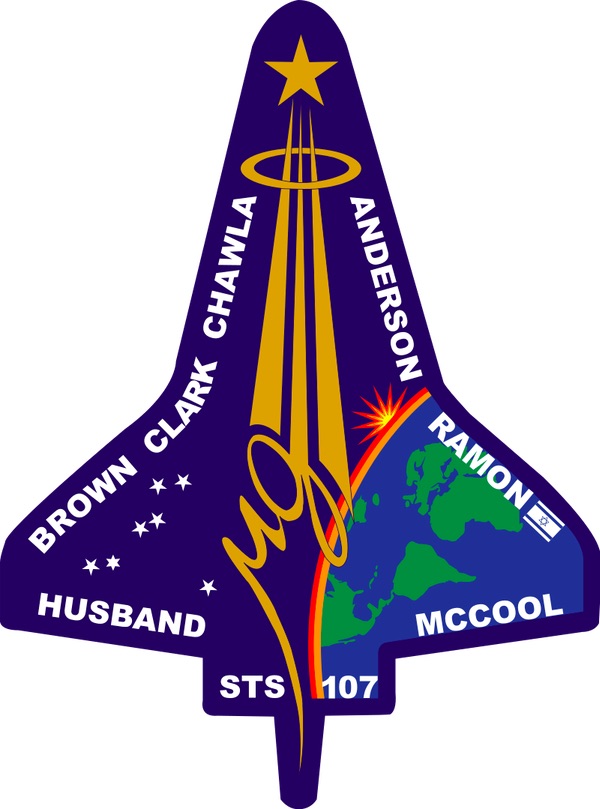All these moments will be lost…by Dwayne A. Day
|
| Many of the NASA people we encountered during our investigation knew the astronauts personally, and some felt responsible, directly or indirectly, for their deaths. |
And so on this day I attended what was considered a highly sensitive subject: an internal study done by NASA personnel on a possible rescue mission of Columbia’s crew. A NASA official sat down in front of me with a cup of coffee, which he finished. And as a NASA astronaut presented the results of the study, I watched as that official slowly shredded his Styrofoam cup into tiny little pieces.
To me, the Columbia accident had been a shock, but it had not been personal. I barely knew the astronauts’ names before the event, and had stopped paying attention to the mission while Columbia was in orbit. But many of the NASA people we encountered during our investigation knew the astronauts personally, and some felt responsible, directly or indirectly, for their deaths. This report on what could have been done to save them if the hole in Columbia’s wing had been discovered in time was like pouring salt on an open wound—like telling people that not only had they allowed the accident to happen, they had done nothing to save their friends. The tension in that room among the NASA people was palpable.
Now, 17 years later, there’s a weird new development in that emotionally-charged issue. Eric Choi, a Canadian science fiction writer, has written an alternative history story about the Columbia mission for Analog magazine where NASA seeks to save the crew. In his story, NASA tries to launch the shuttle Atlantis on a rescue mission. When that mission is aborted, the Columbia astronauts engage in a high-risk backup plan to fill the hole in Columbia’s wing with metal and frozen water. The salvage plan is only partially successful and a few crewmembers successfully bail out of the stricken orbiter, but the remainder perish. Those rescue scenarios are based on the actual ones that I and other investigators heard in the summer of 2003, and which were included in the CAIB final report.
Choi’s story is titled “The Greatest Day,” and it features the Columbia astronauts and some NASA officials. (The story is accompanied by a non-fiction article by Choi explaining his sources about the rescue mission option.) But in a head-scratching bit of fiction, Choi has changed some names but kept others. For the Columbia’s crew, mission commander Rick Husband and Israeli astronaut Ilan Ramon have different names in the story. For the ground personnel, Linda Ham, who chaired the Mission Management Team for the STS-107 mission involving Columbia, has a different name. The main character in Choi’s story is Wayne Hale, who during the actual mission had tried to obtain better imagery of the orbiter after launch photography indicated it had been hit by foam coming off the external tank during ascent. Hale’s effort was shut down by Linda Ham.
It is unclear why Choi changed some names and not others. Could he have feared legal action? The character who runs the Mission Management Team in his story is portrayed extremely negatively, but the mission commander and the Israeli astronaut say and do nothing in the story, so why change their names but not the rest of the crew? Why even use the name “Columbia” in the story?
| For most of the readers, the accident is something they saw on television, “history.” But for some people, “history” is personal, it’s the things they did and did not do, and the people they knew, and loved, and lost. |
Hale is the hero of Choi’s story, taking over the planning of the rescue operations after the mission manager is shuffled aside. During the CAIB investigation, I asked one of my coworkers about Hale and he referred to him as “one of the good guys,” someone who tried to do the right thing during the mission but was thwarted by higher-ups who didn’t want anybody asking questions (see “One of the good guys,” The Space Review, September 25, 2006.)
Alternative history fiction has a long pedigree. There are numerous well-known examples, such as Phillip K. Dick’s story The Man in the High Castle, which in recent years was turned into a television show. History is a legitimate subject for fiction. But usually fiction authors do not write about people who are still alive, or even recently deceased. It’s just odd. I’ll leave it up to the readers to decide if it is ethical. I cannot help but think that Choi’s story will make a lot of people associated with the Columbia accident uncomfortable, and unnecessarily so. For most of the readers, the accident is something they saw on television, “history.” But for some people, “history” is personal, it’s the things they did and did not do, and the people they knew, and loved, and lost. Like that NASA official I watched in that Houston conference room in the summer of 2003, the Columbia accident is the kind of thing that still tears some people apart.
Note: we are temporarily moderating all comments submitted to deal with a surge in spam.
